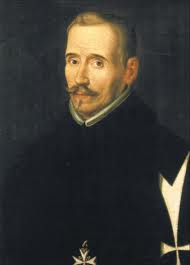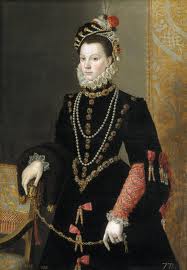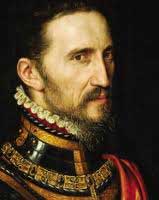Félix Lope de Vega Carpio
Lope was one of the most important poets and play writers of the Golden Age of Spanish literature, second only to Cervantes, and the sheer volume of his literary works makes him one of the most fruitful authors in the universal history of literature. He renewed the formulas of Spanish theatre at a time when theatre was starting to become a common entertainment for the masses, and some of his plays, like Fuenteovejuna, are still represented worldwide.
The Life of Lope de Vega
 Lope de Vega was born in Cantabria the 25th of November of 1562 in the midst of a humble family. His father was an embroiderer, but there's little information on his mother. Lope was a quick and smart boy, and by 5 he was able to read fluently in both Spanish and Latin, and he even composed some verses. His great talent took him to Madrid, to study in the school of Vicente Espinel, whom he admired greatly. Later he also studied in the Study of the Compañía de Jesús, later known as the Imperial School. From 1577 to 1581 he studied in the University of Alcalá de Henares, but he didn't obtain any titles from his studies. On his father’s death in 1578, the embroidery shop passed to the husband of one of the poet’s sisters, Isabel del Carpio. Vega later adopted the noble name of Carpio in order to give an aristocratic tone to his own.
Lope de Vega was born in Cantabria the 25th of November of 1562 in the midst of a humble family. His father was an embroiderer, but there's little information on his mother. Lope was a quick and smart boy, and by 5 he was able to read fluently in both Spanish and Latin, and he even composed some verses. His great talent took him to Madrid, to study in the school of Vicente Espinel, whom he admired greatly. Later he also studied in the Study of the Compañía de Jesús, later known as the Imperial School. From 1577 to 1581 he studied in the University of Alcalá de Henares, but he didn't obtain any titles from his studies. On his father’s death in 1578, the embroidery shop passed to the husband of one of the poet’s sisters, Isabel del Carpio. Vega later adopted the noble name of Carpio in order to give an aristocratic tone to his own.
His rowdy lifestyle wasn't appealing to his mentors, who stopped paying for his studies, so Lope had to work as secretary of aristocrats and notables or writing comedy plays. He enlists with the marines in 1583 and fights in the Battle of Terceira Island.
When Lope arrived back in Madrid, he studied grammar with the Theatines and mathematics in the Royal Academy, and he also served as a secretary to the Marquis of Navas, but he was regularly distracted from his obligations by his love for women. When his first love, Elena Osorio, left him and married the Cardinal of Grandela for his money, Lope de Vega wrote a series of irate plays and sonnets against Elena and her family. For this, he was exiled for 8 years from Court and 2 from the Kingdom of Castile.
 A year after Elena's marriage, Lope de Vega fell in love with Isabel de Alderete y Urbina, whom he married in May of 1588. Less than a month after the marriage, Lope decided to return to the marines and enlisted himself in the Spanish Armada, and he was back by December of the same year. Isabel and he moved to Valencia, where he continued to perfect his play writing skills and he started to stray from the three Aristotelian units of action. This was his first step towards revolutionizing the Spanish theatre of the Golden Age.
A year after Elena's marriage, Lope de Vega fell in love with Isabel de Alderete y Urbina, whom he married in May of 1588. Less than a month after the marriage, Lope decided to return to the marines and enlisted himself in the Spanish Armada, and he was back by December of the same year. Isabel and he moved to Valencia, where he continued to perfect his play writing skills and he started to stray from the three Aristotelian units of action. This was his first step towards revolutionizing the Spanish theatre of the Golden Age.
When his two years of Castilian exile were done, Isabel and Lope moved to Toledo, and he started to work for the Duke of Alba. Isabel died after giving birth in 1594, and a year later Lope returned to Madrid after his exile from Court was over. He remarried in 1598 to the daughter of a meat supplier for Court, who gave him a boy - Carlos Félix - and three girls. Soon after he started to work as a secretary for the future Count of Lemos, with whom he stayed until 1603 when he leaves for Seville. There he met an actress called Micaela, who was married, but this didn't stop her from having five children with Lope.
 For several years, Lope de Vega divided his life between his two families and several lovers. He had to work very hard to keep them all happy, and during this time he wrote a lot of plays and poems to make money, may which were published several times by different booksellers without his consent and corrections. At the age of 38 he was finally able to go over some of his works and correct them, and he fought for the rights to his works so that other couldn't publish without his consent. In 1605 he started to work for the Duke of Sessa until he joined the oratory in Olivar Street in 1610.
For several years, Lope de Vega divided his life between his two families and several lovers. He had to work very hard to keep them all happy, and during this time he wrote a lot of plays and poems to make money, may which were published several times by different booksellers without his consent and corrections. At the age of 38 he was finally able to go over some of his works and correct them, and he fought for the rights to his works so that other couldn't publish without his consent. In 1605 he started to work for the Duke of Sessa until he joined the oratory in Olivar Street in 1610.
At this time, Lope went through a deep existential crisis after the death of some close relatives, and turned more and more towards priesthood. The works he wrote during this time have a deep religious meaning and philosophic inspiration. Carlos Felix, his favorite son, died in 1612 from a fever, and Juana de Gardo, another of his lovers, died a year later in childbirth. All these tragedies affected Lope and in 1612 he decided to be ordained as priest.
Priesthood didn't stop Lope de Vega from his amorous advances, and the Duke of Sessa, fearful of losing his secretary, provided him with women often. Lope fell in love with Marta de Nevares, who stayed with him until her death in 1628. During his last few years, Lope wrote mostly comedy and philosophical poems, often under the name Tomé de Burguillos, but it wasn't a happy time for the writer. Marta de Nevares turned blind in 1626 and died crazy in 1628, and one by one Lope lost his sons and daughter to tragic deaths. He died the 27th of August of 1635.